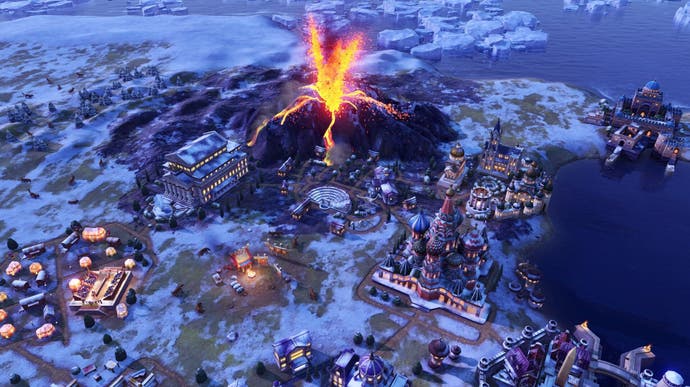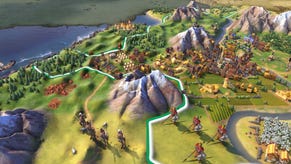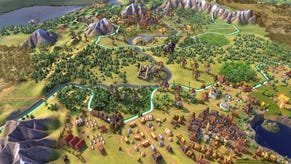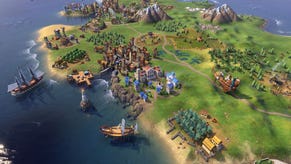Firaxis just announced Civilization 6: Gathering Storm - here's everything we know
Who can save the planet? Genghis Khan.
Civilization 6's next expansion, Gathering Storm introduces global warming as its central mechanic, asking players to weigh up the impact their actions have upon the planet. Burning coal or oil may be easier and cheaper than relying on renewable energy, but you'll risk increasing the global temperature through your actions and losing favour amongst the international community.
We asked Firaxis about the responsibility that comes with developing a game about climate change in 2018 and you can read what its developers had to say here.
But we also dug into some of the more granular details of how this expansion works and what to expect when it releases on PC on 14th February, 2019.
While we're on that topic, Mac and Linux players can expect the expansion shortly after the PC launch and we did ask about the possibility of Gathering Storm (and indeed, the previous expansion, Rise and Fall) coming to the Nintendo Switch, but received no confirmation at this time.
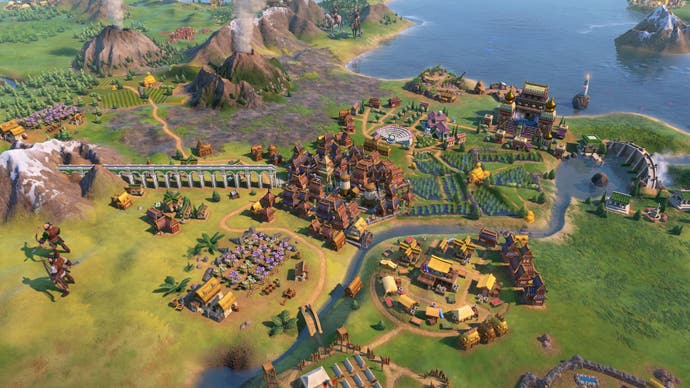
Let's start with the rivers! Unlike in the base game where you may choose to settle a city next to a river and view its floodplains as a static bonus to your food production, in Gathering Storm you'll need to weigh up the potential risks involved. Those floodplains now actually live up to their name and flood.
"There are three different severity levels," explained lead designer, Ed Beach. "When you start a new game, players can decide what their natural disaster setting is going to be: minimal, light, moderate, heavy or hyper-real. They'll pick what they want and if they slide this setting all the way over to the most intense amount, they'll be much more likely to receive severe levels of flooding throughout their game."
However, as you can see in the screenshot above, there are things you do to help mitigate this risk. Pretty early on in your tech tree, from the Classical Era onwards, players can build a new dam district to provide a useful buffer against flooding and offer a natural source of fresh water for their city to boot.
If you aren't able to manage a flood, however, any improvements, districts or units on those affected tiles will receive damage.
"Even your city centre takes a hit," said Beach. "Although it won't ever be wiped out, it could be damaged. I've had some interesting cases, where I've been in the middle of sieging a city, and then a flood came along and significantly helped me finish conquering it, which is always kind of fun."
It's not all bad news though! Any tile that floods also receives a bonus to its fertility, meaning that a crafty player might want to orchestrate this and then reap the rewards if things go to plan.
As you'll be receiving a lot of events popups related to rivers and other geographical features in Gathering Storm, they'll now be named accordingly. If you're playing as France, for example, the first river you discover will likely be called the Loire, or the Senne, or the Rhône. Something similar will happen when you bump into a new volcano for the first time.
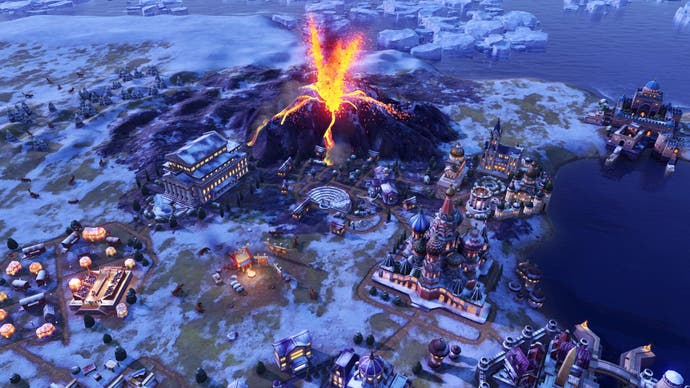
Ah yes, volcanoes! So Civilization 6 already has a sort of continent system in place when it generates new maps and Firaxis has doubled down on this for Gathering Storm. Mountain ranges are much more likely to run along these continental boundaries as if they've been formed by tectonic plate movement. This is also where you'll encounter the most geological activity, like active volcanoes.
"These work very similarly to floods," said Beach. "When they erupt they're going to damage anything nearby, but they're also going to add fertility. But the key difference with volcanoes is that they're much tougher to control than water flooding, you can't just put a dam in place here. So that's going to be a riskier decision to decide whether or not to settle next to one of these."
When controlling a settler unit, any environmental risks and/or advantages will be clearly marked on the map for you to see. Firaxis doesn't want to surprise you with a volcano eruption, it'd much rather have you knowingly take the risk to build in a dangerous location.
But what happens if you start your game in the middle of a continent, far away from any river floods or mountain ranges? To ensure these players also need to grapple with environmental effects, there are also droughts to consider, as well as a variety of storms.
"There are four different types of storms," said Beach. "These can start in different sorts of biomes on the map. We can have blizzards that start in the tundra area or hurricanes that start at sea. Introducing these helped balance everything out so that the effects were nicely balanced across the map."
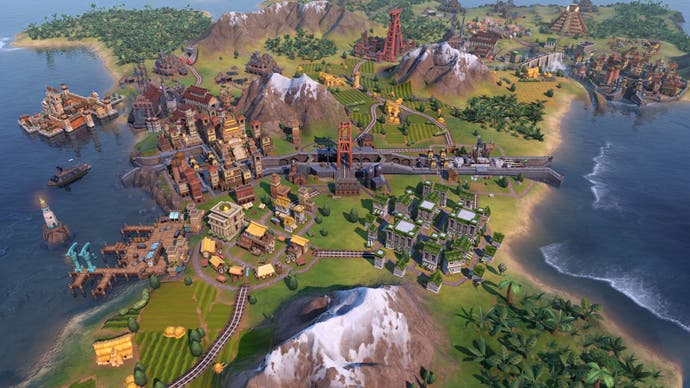
On top of this, the most widespread environmental concern in Gathering Storm is easily the rising sea levels. If things are going badly, entire tiles can be reclaimed by the ocean, which could prove disastrous for a civilization relying on coastal cities. Most interestingly of all, the amount by which the sea levels rise is determined by the actions of every civilization across the entire map.
"We've added a new climate screen which offers a sort of global weather report for you to look at," said Beach. "There's a part of that report that shows you exactly where you're at with CO2 emissions, so you'll be able to see which civ has been polluting the atmosphere the most heavily. You'll see whether or not deforestation is running at expected levels and you can also see how the global temperature has been affected by all of this, based on our modelling of climate change."
As this global temperature inevitably rises over time, polar ice caps will begin to melt and in turn, the sea levels start rising. However, there are options for players who wish to stem the tide.
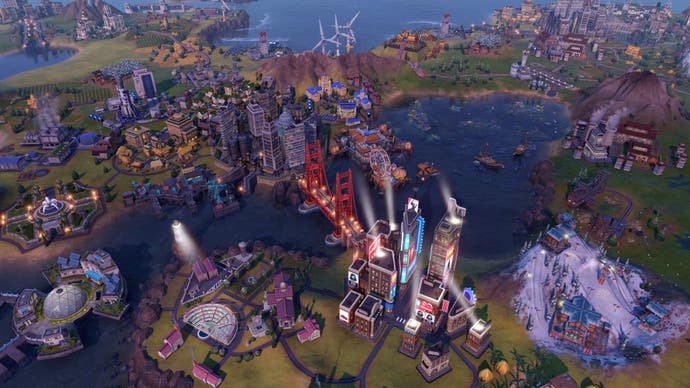
Rather than relying on burning coal or oil, which can sometimes be the easier option depending on what kind of reserves your civilization encounters, players will eventually be able to transition over to renewable energy instead.
"It takes you more time, requires more things to be built and also takes up more space around your cities," said Beach when we asked him why you wouldn't always make this switch. "For instance, the initial wind farm can only be placed on land, so you have to find a hill tile around your city. Hill tiles are pretty useful for production already, if you're going for a space race. But as you get further into the tech tree, you can place your wind farms offshore too."
Players hoping to use renewable energy sources are also given another reason to settle next to a river here, as the dam district can potentially be improved to provide hydroelectric power. Helpfully, this won't require extra tiles, unlike those early wind farms.
Civilizations that stick with fossil fuels regardless may also face pressure from other civilizations via the World Congress. If you're hoping to chase Gathering Storm's new Diplomatic Victory, this could be a big problem.
"The World Congress starts in the Medieval Era," said Beach, "and one thing that's really important to note is that we have it split into two different types of sessions, so the one that's the easiest to explain right away is that we took the emergencies from Rise and Fall and made them something that falls under the umbrella of the World Congress instead."
This means if a city-state is conquered or a holy site is converted to another religion, the injured party will need to call upon a special session of the World Congress to vote on the matter. Rather than the emergency automatically happening, the vote will then need to be passed in order to trigger it. Players will be able to use a new currency called Diplomatic Favour, earned throughout the game, to help influence these votes.
"Having a stockpile of diplomatic favour can work in two ways here," said Beach. "You can ensure that the emergency goes through, or maybe you're the civ that conquered that city-state in the first place and you want to make sure everyone leaves you alone."
The other half of the World Congress is referred to as 'normal sessions' and it's here that the various civilizations come together to vote on matters that will temporarily change the rules of the game. This will feel somewhat familiar to Civ 5 players, allowing you to vote on things like banning luxuries or encouraging trade with a particular civilization.
"You get to vote on every World Congress resolution without spending favour," said Beach. "But if you want to truly emphasise your vote, that's when you add favour to make sure your side goes through."
However, you may wish to bank that diplomatic favour for the start of the Modern Era instead, as it's here where the World Congress meets to vote on which civilization is currently in the best standing within the world community.
"Whoever has the most votes cast for them will not instantly earn the Diplomatic Victory," clarified Beach, "but they will earn points towards it. You can also earn points by winning climate accords, or by winning other scored competitions like the world games or hosting the world's fair.
"We're working to balance the game right now and one of the things we're balancing is exactly how many diplomatic points you need to reach to get a Diplomatic Victory. We're trying to make it so this can be achieved early in the 21st century, just like the other victory types."
In fact, each of the game's victory types is being rebalanced to ensure each game lasts a further 30 or 40 years on average. The Future Era has been added in Gathering Storm and as the name suggests, this will contain scientific and civic progress we have yet to achieve.
"The interesting thing about this era is that because these are technologies and civic advances that humankind has not reached yet," said Beach, "we couldn't really decide what a tree for those would really look like and what prerequisites would be required. So, instead, that part of both your tech and civic trees is actually randomised at the start of the game."
Finally, as this is a new Civilization expansion, it's fair to expect some new civilizations to play around with. We're told there'll be eight in total, along with nine new leaders, similarly to the previous expansion, Rise and Fall.
As of writing this piece, we're yet to have seen the trailer itself which may hint at some of the new civs we can expect. But more importantly than that: did they kill Sean Bean again? I bet they did. Poor Sean never catches a break.
